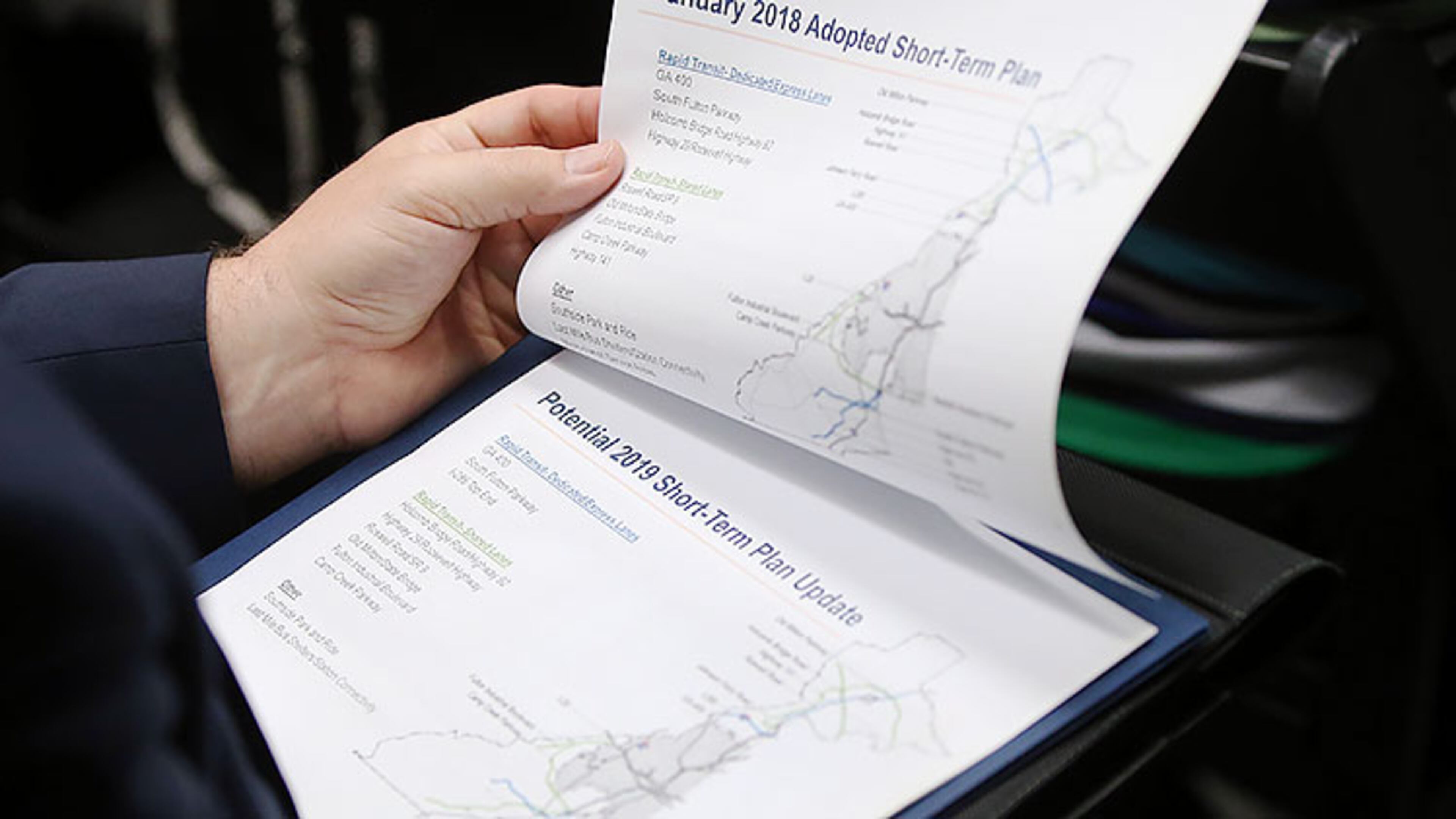Fulton adds rapid buses on I-285 to transit plan, vote in 2020 likely

A proposal to bring bus rapid transit to the top end of I-285 got a vote of confidence from Fulton County leaders Friday as they eye a $1.3 billion referendum next year to expand public transportation across the county.
The decision to include the I-285 proposal in a list of Fulton transit initiatives is a major hurdle for the plan, which has been discussed by mayors in Fulton, Cobb and DeKalb counties. Friday’s vote by mayors and Fulton commissioners was the first time the proposal had made it to a countywide transit plan. Cobb and DeKalb have yet to take action on the proposal.
In addition to I-285, the countywide proposal calls for the construction of dedicated or managed lanes with bus rapid transit on Ga. 400 and South Fulton Parkway. Bus rapid transit, which does not yet exist in Georgia, has dedicated stations and fewer stops than regular buses, but vehicles operate on roads instead of rails.
Additionally, the county's plan calls for six main arterial routes, where buses would have the technology to change traffic lights or jump traffic, but would not have dedicated lanes. Several of those lines, in the north and the south part of the county, would connect to existing MARTA stations to further expand the transit network.

In deciding to delay a potential vote to 2020 on whether to raise sales taxes by .2 cents over 30 years, instead of rushing to hold it this year, leaders acknowledged the importance of a robust voter education campaign and high turnout. After the failed MARTA vote in a low-turnout Gwinnett special election this year, Fulton leaders said they want to ensure they give the measure the best chance of passing.
Inclusion of a plan on I-285 could be a way to attract Fulton voters in a high-population part of the county, leaders say, as well as show other communities the value of transit.
"If we don't have a system they can connect to, they're not as likely to join the system," said Liz Hausmann, a Fulton County commissioner. "This is a six-mile span, but it's critical to the whole regional network."
The move, though, was not without its detractors.
Deanna Ingraham, the mayor of East Point, voted against the project list. Ingraham said she didn’t have enough information about how the I-285 project came to leapfrog its way on to the list, and while she might be in favor of it in the future, she didn’t feel that the south side of the county was being treated equitably.
That was a common refrain from southside mayors, who questioned why north Fulton seemed to get more of the resources, even though south Fulton could see more of an economic benefit from increased transit investment.
Tom Reed, the mayor of Chattahoochee Hills, said the county's transit focus seemed to be very north-centered. In recent months, much of the attention regarding transit in the county has been on planning for bus rapid transit along Ga. 400, a project that would be built in tandem with the managed lanes that are being built there.
But that has led to south Fulton leaders feeling like their needs are being overlooked. Reed said south Fulton County has high ambitions and high capacity for growth, and dollars spent on transit could go further if spent there. Still, he voted for the proposal as a way to keep the conversation going.
Rusty Paul, the mayor of Sandy Springs and an advocate of the I-285 project, said he and others had worked to find a regional solution — not just one that affected Fulton County.
“Fulton has been shouldering what’s supposed to be a metro Atlanta system for many, many years,” said Johns Creek Mayor Mike Bodker, who voted against the list, saying he wanted more information about the efficacy of the projects on it. “The massive advantage of any project is that it puts another hook in those counties.”
In the past, discussions about transit among the Fulton mayors have focused on congestion relief. But Fulton County Manager Dick Anderson, along with south Fulton mayors, argued that economic vitality should also be taken into consideration. And the discussion included some debate about whether a sales tax is the the best way to fund the system.
The region is supposed to have a comprehensive, integrated plan, but Anderson questioned how that can be the case if each local jurisdiction has to pass their own referendum for a regional plan to be funded.
"The larger question is, is this the most appropriate way to do this?" he asked.
With leaders making a decision to not take anything to the voters this year, Anderson said, there is more time to explore other sources to pay for the plan. Of the projects currently on the list, all could be completed within a decade. Union City Mayor Vince Williams said ideally, that would just be the beginning.
“Hopefully, we’re making a decision that will outlive us all,” he said.
FULTON COUNTY TRANSIT PLAN
Fulton County leaders on Friday agreed to move forward with a countywide transit plan. The plan is contingent on voter approval in a referendum that is likely to occur next year. The working list of projects includes:
- Dedicated or express lanes for rapid transit on Ga. 400, South Fulton Parkway and the top end of I-285 in Fulton County.
- Shared lanes for rapid transit on Holcomb Bridge Road/Highway 92, Highway 29/Roosevelt Highway, Roswell Road/State Route 9, Old Milton/State Bridge Road, Fulton Industrial Boulevard and Camp Creek Parkway.
- A southside park-and-ride lot.
- Bus shelters and other last-mile station connectivity projects.


